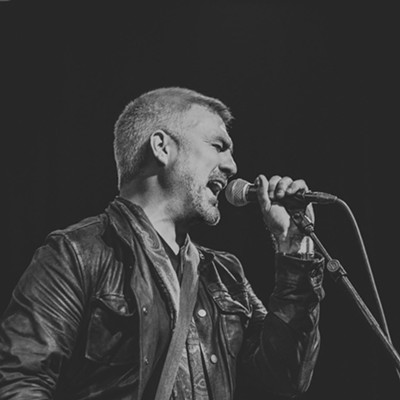The New York City avant-garde jazz trio Zevious is barnstorming the country, bringing spiky, assertive electric jazz to listeners who are hungry for adventurous music.
"It's interesting to find that niche in New York, where we often play to 200 people who have such a wide range of choices when they go out. But we pretty much know that we can get that size audience each time we play (in New York)," says guitarist Mike Eber. "Whereas, in other cities, we can never count on a certain size of audience. And we find that people who come out to see us in other parts of the country are more starved for music that challenges them. So we try to make it special for them."
Zevious is heading to Tucson for a gig on Wednesday, March 30, at Solar Culture Gallery. Also on the bill will be Tucson's Gamma Like Very Ultra.
The three members of Zevious—all around 30, give or take a year—have known each other for a long time, although they've only been playing together as a whole for about five years.
Eber met bassist Johnny DeBlase in 1999 while attending Muhlenberg College in Allentown, Pa. Both graduated with degrees in music and went on to become musicians. They ended up in New York, as did Eber's cousin, drummer Jeff Eber, who was actively engaging the country in his progressive/avant-metal act Dysrhythmia.
The Eber cousins have known each other since they were small. Before Zevious, they'd never played together (not counting jam sessions, while slightly inebriated, when their families would come together for holidays).
At the group's 2006 formation, they used all-acoustic instrumentation. Mike Eber played on a hollow-bodied jazz guitar, and DeBlase played upright bass. This was reflected in the arrangements on Zevious, the trio's 2008 debut release.
Shortly after the first album, the band began developing a new, more-electric sound, radically defying genre boundaries. Mike Eber picked up a Telecaster, and DeBlase moved from upright to electric bass and distortion pedals.
The transition from the predominantly acoustic jazz of the trio's debut to the electrified crunch of its 2009 sophomore release, After the Air Raid, has invited a wide variety of comparisons to other artists.
Touchstones for Zevious' work include contemporary jazz improvisers like Vijay Iyer and Ben Monder, so-called math metal bands such as Meshuggah, the pioneering jazz-rock fusion of Mahavishnu Orchestra, and the progressive rock of Magma. Kindred spirits also include aggressive outfits such as Fred Frith's Massacre, Ronald Shannon Jackson's Decoding Society and James "Blood" Ulmer's Music Revelation Ensemble. You can definitely hear those artists in Zevious' sound, although Eber claims they are simply kindred spirits, rather than influences, because he listened to very few of those acts before forming Zevious.
Zevious' label, Cuneiform Records, characterizes the band as combining free or out-there jazz with something called "punk jazz." The first two terms are accepted and boast historical precedence. But Eber isn't as comfortable with the concept of "punk jazz."
"I feel like that's a term that the label feels it needs to use to represent us and our sound, but I don't even know what it means," he says. "I'm never very good with labels, making them up or understanding them, so it sort of misses the target with me."
One wonders if perhaps punk jazz is something played by relatively young musicians with an aggressive bent, fueled by the DIY spirit and an unfaltering energy, intended to counter the status quo. It's about the attitude, maybe?
"In my mind, it's different," Eber says. "To me, punk has this connotation with sloppiness and looseness, which are two things that we definitely are not. I mean, you should see our rehearsals. We get a little anal, making sure that every lick and note is in the right place. We play really ultra-tight, even though there are sections that are loose and open.
"Also, we don't really swing. So I guess in that sense, we are revolting against the norm in jazz. Defining your approach to playing jazz music can sometimes be the most challenging of things when you start playing together."
Contrary to Eber's claim, Zevious does manage to swing in their music. The manner in which he weaves fluid guitar melodies into the propulsive, changing time meters creates an effective tension between contraction and release which is not foreign to swinging. It may be knotty and cerebral, but there's a surging groove in Zevious' music.
On the other hand, Eber says it's all well and good to have solid, conservatory-trained technique, but he and his bandmates strive not to allow themselves to become too coldly academic or drift into excessive self-indulgence.
"That is something I feel strongly about," he explains. "We all went to jazz school and tend to be sympathetic with academia, but there is a lot of technically precise and well-composed music out there that is deadly boring to listen to. What we are trying to do is create music that is precise and sound in its theory, but still packs an emotional punch."
The same might be said of the artists who Eber feels have had the most influence on his composing and the music of Zevious. He especially respects the modern classical works of composers such as Iannis Xenakis, György Ligeti, Belá Bartók and Igor Stravinsky.
"I mean, no one outrages listeners any more the way Stravinsky was able to incite a riot at the premiere of his Rite of Spring," he says. "It's harder to have that visceral effect on listeners now, in this day and age. It's sort of my secret desire to change the listener's life and perceptions enough, just for the length of the performance, that they sort of freak out like that."







